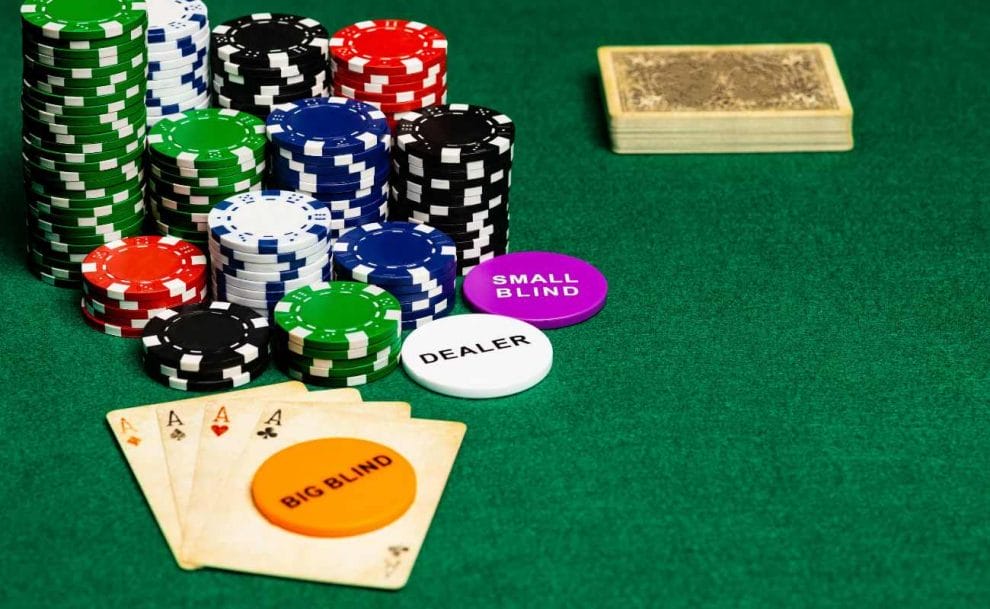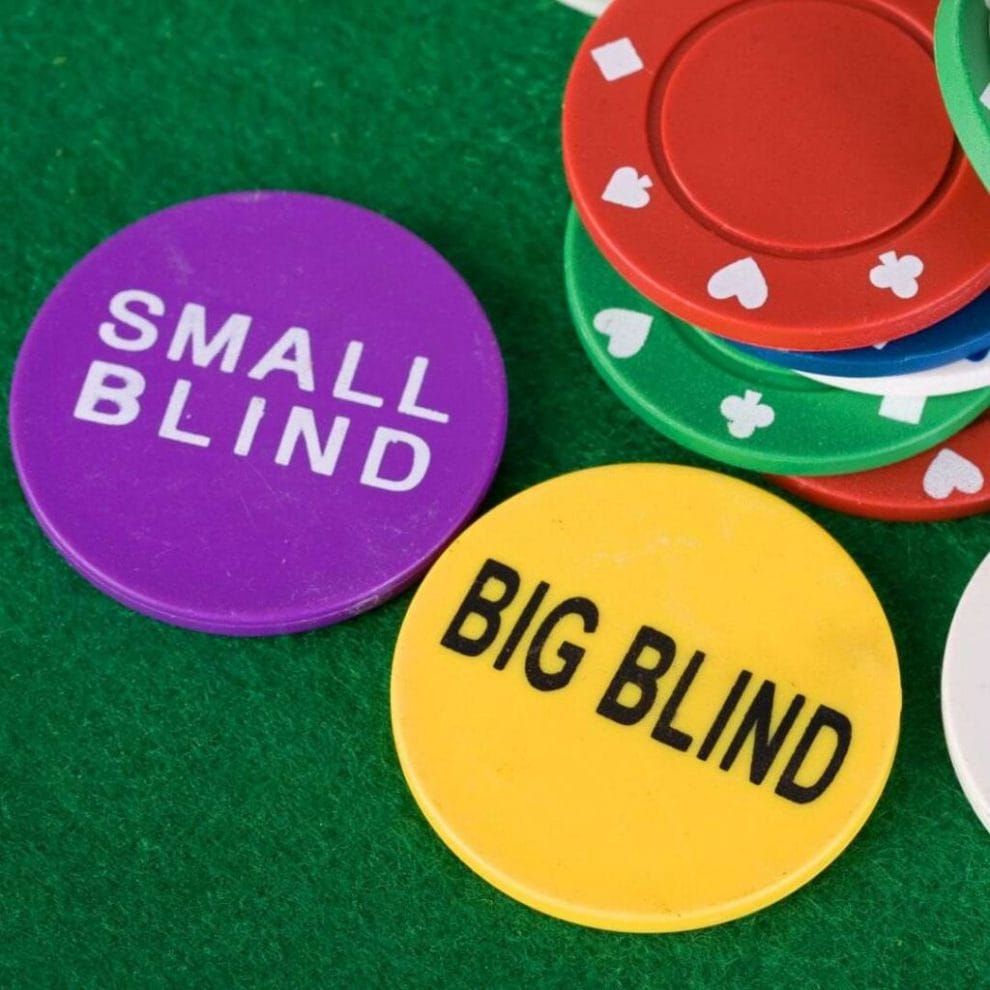
A standard No Limit Texas Hold’em game uses two forced bets known as the big and small blinds. Whether you’re playing online poker or an in-person game, there are very few exceptions to this particular structure.
Since the poker blinds move around the table with each hand, you’ll be required to play from these positions at some point. And given that your money is at stake before you’ve even seen the cards, it’s essential to adjust your strategy accordingly.
In this guide, you’ll learn expert tips and common mistakes to avoid when playing from the blinds.
What Are Blinds in Poker?

Before anything else, you need to know how the blinds work. They’re essentially just forced bets, with the small blind usually fixed at exactly half the big blind. These compulsory bets are added to the pot by the two seats immediately to the left of the dealer button.
Poker blind rules force the action in poker, ensuring there’s always money in the pot. In cash games, the big blind and small blind are fixed in value. However, they’ll increase over time during tournaments.
Without them, games would be far less exciting. Players would have little incentive to play their hands. As a result, folding would be much more common for all but the strongest hands.
How To Play From the Blinds
When you’re in one of the two blind positions, your strategy needs to change. It’s a difficult position to be in, as you’ll have money committed to the pot no matter what your starting hand is. In addition, you have to act before all other players postflop, leaving you at a disadvantage.
With the rake in poker games and the fact that you’re out of position, it’s challenging to make long-term profit from the blinds. From either spot, you’re reacting to your opponents rather than the other way around. This means it’s more about minimizing your losses where possible.
Most opponents only play strong hands, like good aces, broadway cards, pairs, and some suited connectors from the blinds. However, this doesn’t mean you should always fold unless you have these. Whether playing fixed, pot, or no-limit poker, always look to capitalize on any edges available from the blinds.
Things To Consider in the Blinds
It makes sense to tighten up from the positions where you have a lower chance of success. However, your strategy should still depend on many other factors at the table. Consider the following before deciding whether or not to play your hand:
- Did an opponent raise before you?
- What position are they in?
- What type of player are they?
- What’s their stack size?
- Are multiple players in the pot?
- What’s your hand strength?
- What’s your table image?
As you can see, your blind strategy is highly situational, far more than any other position at the table. However, there are some common betting strategies poker players use when in the blinds.
Blind Play Strategy
The blind positions put you at a disadvantage, but you can still make the best of a bad situation. You can use these cash game tips and strategies to minimize losses and make the most of any edges you encounter.
Use the Small Blind for Steals
When playing from the small blind, you can steal pots by open-raising more often. While this might seem counter-intuitive to the advice of playing tight, it’s a great way to improve your win rate from this position.
Players in the big blind tend to over-fold, and you can exploit this behavior by open-raising. Preflop, you can act after all the other players. If no opponent has already raised, you can safely put pressure on the big blind.
This strategy aims to take down the pot preflop, so a larger raise size is necessary. Generally, you want to raise around three times the value of the big blind. That way, there’s little incentive for them to call. However, be careful if they’re an aggressive opponent.
Defend Your Big Blind
The previous strategy is all about exploiting the tendency of big blind opponents to over-fold. Well, you’ll also want to avoid others using this trick against you. As such, you should defend this position more often.
As the big blind, you’ll often get a better price on the call than you would from other positions. This means you can defend with a broader range of hands despite having less equity. Still, you need to back this up with an assertive play postflop.
If you try to defend your big blind with weak or passive play, you’ll just lose money in the long run. Be careful about the ranges that you defend from. When playing online poker tournaments, ensure you’re not needlessly fighting for every pot.
Never Donk Bet
Donk betting is generally looked down upon and is unfavorable in most situations. When playing from either blind, donk betting is definitely not a good course of action. It’s one of the biggest poker mistakes to avoid, even if you have the nut advantage.
A donk bet is where the preflop caller leads with a bet when out of position postflop. Donk betting puts you at a disadvantage because you’re getting aggressive with a weaker range against an opponent with a stronger range.
Another reason to avoid donk betting is because you risk giving your opponents too much information. When playing from the blinds, the opponents behind you know more about your range. Donk betting narrows your range, while checking prevents you from giving things away.
Check-Raise Aggressively
Postflop, you must avoid playing passively wherever possible. Check-raising rather than check-calling will generally help you to win more pots. This strategy forces opponents who are bluffing or holding marginal hands to fold.
Additionally, check-raising punishes opponents who are c-betting with a range that’s too wide. Many players fall into the trap of simply check-calling from the blinds, which means they fail to assert themselves and have less chance to take the pot.
If you’re following this strategy, you need to use it on board textures where you have enough strong value hands. This way, you’ll balance your range with bluffs and can check-raise more aggressively without worrying about opponents calling.
Maximizing Your Success From the Blinds

Playing from the blinds isn’t usually fun, but it doesn’t necessarily have to be a bad thing. Although your chances of success are lower when you play from these positions, there are still strategies you can use, as you’ve seen. To try some out, register at Borgata Online today and jump into a whole host of Hold’em tournaments and cash games.
